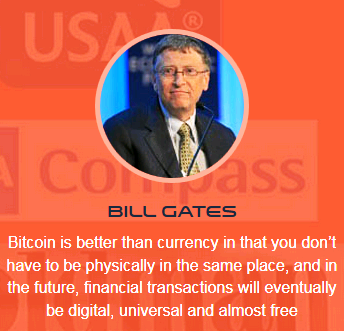What Are Bitcoins?
Digital currencies are on the rise and their popularity is fueled by a number of different factors.
- 1. Bitcoin is decentralized - no central bank.
- 2. Bitcoin is anonymous - all transactions are private.
- 3. Bitcoin is convenient and cheap - instant, low cost transactions with no debit/credit card or bank required.
The advantages of bitcoin are clear, but what exactly is a bitcoin?
What is a “Bitcoin”?
Bitcoin
is often described as being like something in between gold and a dollar
bill - it’s not quite a currency (no one’s printing it) and it has
elements of gold (limited supply). It is called a ‘digital currency’ and
it can only be created and stored online. There is no single entity
that controls bitcoin, all transactions are made ‘peer to peer’ i.e.
from one individual to another and all transactions are entirely
anonymous.
Bitcoins are produced
by several users running computer scripts all over the world; these
scripts solve difficult mathematical problems and once solved, an amount
of bitcoin is ‘released’. These mathematical problems ensure that
transactions are anonymous and it also gives rise to the term
‘cryptocurrency’ which is often used to describe bitcoin.
Bitcoin
is used to purchase products and services electronically, and there’s
an increasing demand for bitcoin in markets where anonymity and security
is crucial.
Bitcoin is Decentralized
The
best way to describe a bitcoin transaction is to compare it with a
typical ‘cash in hand’ transaction from many years ago. When an
individual purchases an item from another individual with cash, there is
no government record taken to know that this transaction ever existed.
While all bitcoin transactions are monitored on the ‘block chain’, much
like cash payments, there is no record of the individuals involved in
the transaction.
Bitcoin does not
run through a central bank and there is no ‘bank’ that controls money
supply by printing or removing bitcoin from the market. Bitcoin is
produced through these mathematical problems mentioned above and there
is a limited supply that cannot be manipulated by anyone, anywhere in
the world.
This lack of government
or bank control means that seizures of bitcoin are theoretically
impossible. The impact that Black Friday had on the poker community many
years ago cannot be repeated if players deal with bitcoin.
Who Created Bitcoin?
Bitcoin
was developed by a software developer known as ‘Satoshi Nakamoto’.
Satoshi grew tired of the conventional means of processing payments and
the fees that came with them, so his idea was to create a currency that
was unlinked from “legal” currencies and the associated transaction
fees. This isn’t to say that bitcoin is free from fees, but the fees on
transactions are heavily reduced and are insignificant in comparison to
what you might expect from a wire transfer or PayPal.
Who Owns Bitcoin?
No
one owns bitcoin; the currency is held entirely on the Internet and
there is no single person, business or government with control over its
supply or the rules on how it can be used. Bitcoin is generated by a
‘pool’ of bitcoin ‘miners’ that run these mathematical problems to solve
the blockchain and earn bitcoin. This network of miners is also the
very same network responsible for processing the transactions that take
place, meaning bitcoin is not only a currency, but a payment network as
well.
Are There Unlimited Bitcoins?
Bitcoin
is limited because the protocol that established the network is
forcibly capped at releasing around 21 million bitcoins. However, this
is 21 million ‘whole’ bitcoins. A single bitcoin can be divided into
halves, quarters, tenths and still transacted - in fact, the smallest
possible amount of bitcoin is called a ‘Satoshi’ and is 0.00000001 of 1
bitcoin. In this regard, there is plenty of bitcoin to go around.
Bitcoin Mining
Bitcoins
deviate from the norm when compared with traditional currency.
Traditional currencies were once based on the value of gold and silver.
Consumers could then look to the price of gold and silver to get an
understanding of what their currency was worth. But bitcoin shares none
of these traits, and is based on mining and mathematical problems alone.
Users
across the world are running software programs to solve the
mathematical problems that produce bitcoin. The Bitcoin network has an
estimated 100,000 active users at any given moment, which continues to
grow on a daily basis as more and more ‘miners’ attempt to earn bitcoin.
5 Key Points to Remember About Bitcoin
Now
that you have a good understanding of bitcoin, be sure to keep in mind
these 5 key points when it comes to using the cryptocurrency:
- 1. Decentralized:
there is no one central authority for bitcoin. Banks, governments and
businesses cannot control transactions and are unable to seize funds
from any bitcoin users.
- 2. Easy to use:
once you’re familiar with bitcoin you will find it easy to use.
Accounts can be set up in minutes while bank accounts can take months
with various hoops to jump through. There are no questions and no fees
to setting up a bitcoin wallet.
- 3. Anonymity:
spend your money on what you want, when you want. Bitcoin is an
anonymous way to transfer value through the Internet - go have fun!
- 4. Transparency:
the blockchain publicly stores all transaction information for anyone
to see, meaning that while transactions are anonymous, they are entirely
transparent.
- 5. Free from fees:
one of the most important wins for bitcoin is that the fees pale in
comparison to a traditional money processor. Sending the equivalent of
$0.01 through the Internet is now easy and makes microtransactions more
accessible for everyone anywhere in the world.
























